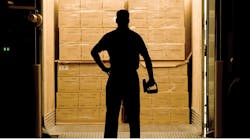Large corporations are not above the law, and that includes occupational health and safety regulations. Anheuser-Busch's recent encounter with OSHA over the safety of their New Jersey warehouse resulted in a $162,000 fine, and this is not the first time that a multinational business has been accused by a workplace health and safety agency of flouting warehouse safety.
Amazon’s warehouse has come under fire for its working conditions and one big retailer in the UK was accused of pushing the limits of safety after its distribution center received 76 ambulance calls over the course of two years. That’s an average of over three ambulance emergencies a month.
Ignoring warehouse safety always comes back to bite employers in the end. Whether it’s in the form of bad publicity or, in the case of Anheuser-Busch, a hefty fine. There are no business benefits to operating an unsafe warehouse.
Consistency Is Key
An important aspect of warehouse safety is to ensure there is consistency in global warehouse safety standards.
As a company grows and acquires operations or opens new ones, different parts of the company can take on lives of their own. This is why very large corporations often have strict company-wide policies.
McDonald’s is a truly global business, but their business goals are made clear on their site: good food, good people, good neighbor. Whether or not you feel McDonald’s achieves these aims is beside the point; the fact is that they state that these company-wide goals loudly, proudly and consistently and apply them throughout their global operations.
Companies need to have this same attitude when it comes to warehouse safety. While some aspects of a business can benefit by acclimating to the local culture and standards – such as a fast food chain making their food more in line with local tastes – this absolutely does not apply to warehouse safety. Warehouse safety is the one area where companies should adopt as their corporate-wide policy the toughest requirements from the countries in which they operate.
Legal requirements for warehouse safety vary from country to country, but that doesn’t mean that companies should vary their standards. The British Health and Safety Executive (HSE) recommends a racking inspection at least once every 12 months from a SEMA-approved racking inspector for all warehouses in the UK. In parts of Australia, they recommend a racking inspection from a racking inspector once every six months. By contrast, U.S. businesses are not obliged by OSHA to carry out third-party racking inspections at all.
Forklift safety is another example of different sets of safety regulations for different countries. HSE recommends that forklifts are inspected once every 12 months, whereas OSHA is much less specific. It requires maximum stacking heights for forklifts (20 feet), but doesn’t state how often a forklift should be inspected. A cursory glance at a few countries’ warehouse safety requirements will help businesses shape their forklift safety program.
The key for companies is to create and follow one system that achieves compliance for every country in which they have operations. If every warehouse is following the same warehouse safety policy in every country, then there significantly is less chance of confusion. More than this, businesses will be able to avoid situations where one particular warehouse does not achieve the same level of safety as the others. This especially is true in Canada, where warehouse safety regulations vary by province. In Ontario, staff are expected to be trained enough to carry out safety inspections across the whole warehouse every day.
This stringent legislation allows for a much safer workplace, and so it would benefit employers to implement this measure across all of their warehouses and not just the ones that they plan on operating in Ontario. Otherwise, they’ll end up following multiple safety procedures in Canada alone. Being safe is not about meeting the bare minimum requirements, it’s about commitment, diligence and consistency.
Safety regulations should not be seen as shackles that big businesses can free themselves of by working in different countries. According to OSHA, safer businesses are more profitable. Fewer accidents means less lost time, fewer lawsuits and a more motivated workforce. Added to all this, a safe business looks better to the public and to potential investors.
Anheuser-Busch’s OSHA fine should make it clear that having an unsafe warehouse is not profitable. After all, $162,000 is a lot of money and it could be better spent on preventing injuries and property loss by increasing warehouse safety. Warehouse safety does not restrict good business; warehouse safety is good business.
About the Author: Justin O’Sullivan is a racking inspection expert who specializes in training big businesses and small businesses to operate their warehouses to the HSE standard.
